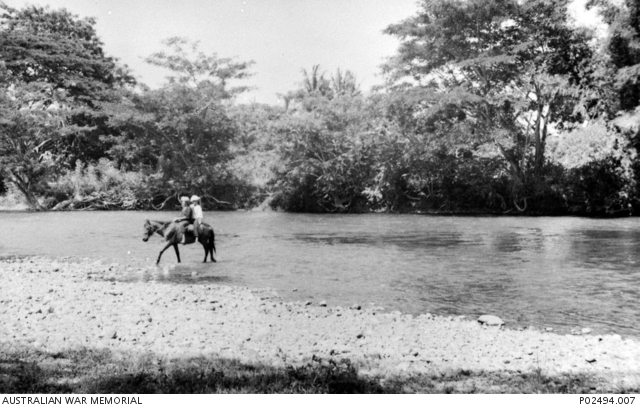| Accession Number | P02494.007 |
|---|---|
| Collection type | Photograph |
| Object type | Black & white, Landscape |
| Physical description | Black & white, Landscape |
| Date made | October 1950 |
| Conflict |
Second World War, 1939-1945 |
| Copyright |
Item copyright: Copyright expired - public domain
|
Labuk River, North Borneo. October 1950. A horse carrying two natives makes its way along the ...

Labuk River, North Borneo. October 1950. A horse carrying two natives makes its way along the edge of the river near Telupid. This was one of the stopping places for the prisoners of war who were marched by the Japanese from Sandakan to Ranau between January and August 1945. At this spot ten prisoners were shot. Members of the combined Australian-British Reward Mission also stopped here during their visit in 1950. Their task was to reward those natives who had assisted prisoners of war. In 1946 the Mission, led by Major (Maj) H. W. S. (Harry) Jackson, Australian Government representative, was joined by Maj. Dyce, representing the British Army, and two journalists from the ABC, Colin Simpson and William McFarlane, travelled to North Borneo to investigate, report and reward the assistance provided to Australian and British prisoners of war (POWs) by local natives. In 1942, 1800 Australian and 600 British POWs were sent to Sandakan from Singapore and Java. Those prisoners still alive in the Sandakan POW Camp in January 1945 were forced to help evacuate the Japanese Imperial Army from Sandakan to Ranau in three brutal death marches where the men were forced to march the 150 miles to Ranau. Any POWs still alive after the last march, were killed. Only six prisoners, who had all escaped during the death marches, were still alive at the end of the war. POWs had made pledges to the local people who had assisted them and the Australian Government decided that these obligations should be investigated and rewarded. The Mission group retraced the route taken by the prisoners of war and investigated the claims in order to recommend rewards to those natives. (Donor H. W. S. Jackson)
